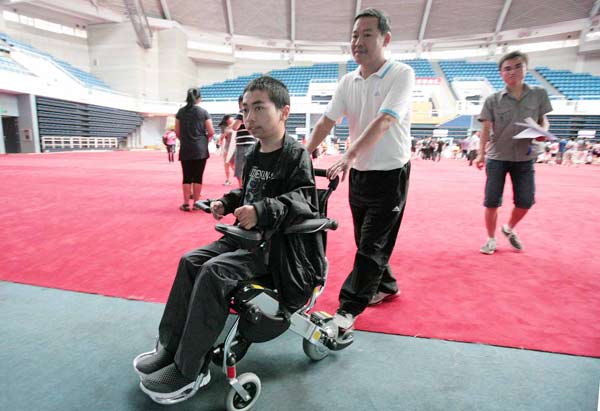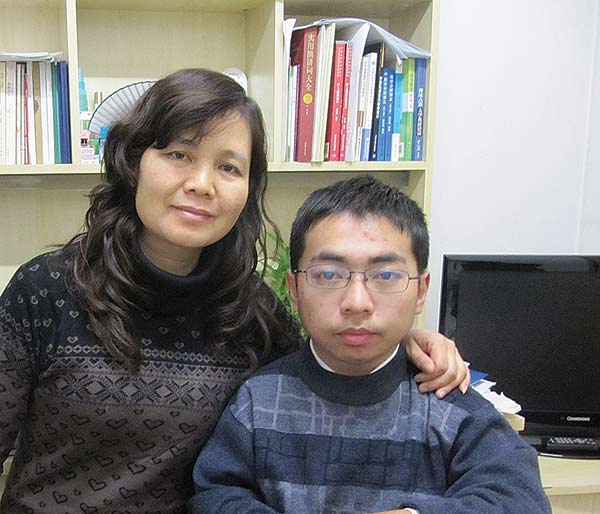
5 Dec, 2013
Disability no barrier to one Chinese young boy’s can-do spirit
Beijing, (China Daily) 2013-12-03 – When he talks about his disability, Yi Xiaoyuan has a serious look on his face. His voice doesn’t halter and his gaze doesn’t wander. He has been in a wheelchair for 10 years, since he was 11 years old and his rheumatoid arthritis worsened.
With his mother sitting next to him in his dorm room at Tsinghua University, his responses are measured, and his voice confident. He wants you to know about his disability not because he considers himself exceptional, but because in China, disability is often not spoken about with this kind of frank openness.
 |
|
Yi Xiaoyuan, accompanied by his father, came to register as a new student at Tsinghua University in August 2012. China Photo Press |
“Disabled people in China don’t need money or sympathy,” Yi says. “What they need is a chance.”
Now in his second year as a computer-science major at Tsinghua, Yi has received that chance.
The China Disabled People’s Federation estimates that in 2012, there were up to 8,000 students with disabilities in China’s higher-education system.
Staying with Yi in a firstfloor dorm room next to his – connected by a shared foyer, a kitchenette and bathroom – is his mother, Guo Qiongfen. She left behind her job as a nursing teacher, as well her 10-year-old daughter and husband 2,700 km away in Yuxi, Yunnan province, to care for her only son in Beijing. Although both of them have effusive praise for the help Tsinghua has given them, financial and otherwise, they acknowledge that without her help Yi couldn’t shoulder the burdens of student life.
“My family means everything to me,” he says.
Besides the 20-minute journey to class every day in his electric wheelchair, his mother helps him wash, dress and do other things many of us take for granted. With her background in medicine, she also directs his daily therapy sessions. The price of their accommodation includes cleaning by the dormitory staff, but she politely declines the service and uses her spare time to sweep and mop the tiled floor. She doesn’t want to be a burden, she says.
Upon applying to Tsinghua, Yi was contacted by an admissions representative who promised he wouldn’t be turned away because of his disability. Yi was advised which majors would be the most feasible and which, like automotive engineering, would be next-to-impossible. Because the Chinese student dormitories were not wheelchair-accessible, he was offered a comparatively plush international student dorm room for the same price, 1,500 yuan ($246) per year. For her room, Guo pays the full international price of 80 yuan per day (roughly 2,400 yuan per month).
Childhood cut short
Yi was born in Yuxi, a city of 2.5 million people, 90 km south of Yunnan’s capital city Kunming in Southwest China. For the first six years of his life, he developed normally, according to his mother. He was a happy boy, with round cheeks that dimpled when he smiled, as they still do, and an undeniable intellectual precociousness.
At age 6, the troubles started. His development became abnormal, and in addition to rheumatoid arthritis, he was afflicted by a bone disorder that became progressively more debilitating. By 11, walking had become too excruciating and his legs too frail. He had to use a wheelchair. From that point forward, Yi’s mother and his father, a policeman in Yuxi, stopped at nothing to give their son a chance to overcome his disability.
“My parents gave up many opportunities,” he says, suddenly struggling for words. “My father could have been promoted, but he would have had to go to Kunming, away from me in Yuxi. He turned it down.”
Since primary school, Yi’s mother, Guo, has made sure he gets to school each day, and helped him from breakfast to bedtime. She says the whole family loves him and that the sacrifices come naturally. “I couldn’t help but feel guilty after his condition worsened,” Guo says. “Despite working in healthcare industry and spending all this money, I couldn’t cure my own son.”
Despite his physical limitations, Yi excelled academically. When it came time to take the national college entrance exam in 2012, he scored 16th highest in all of Yunnan province. It was his dream to get into Tsinghua. Now, he had the score to do it.
Yi’s first impression of Tsinghua, whose gates he’d dreamed of entering for as long as he could remember, was surprise at its enormity. The vast, walled campus is a city unto itself and as he watched students zip down the roads on bikes and scooters he wondered about the logistics of getting from A to B in his wheelchair.
It was his first time in Beijing, his first time away from the south of China. But his mother was with him, and his family and friends, whose support he’d leaned on for so long, were counting on him. He was determined not to let them down.
Student life, on wheels
His room is meticulously organized and spotless. On his bookshelf, GRE study guides are neatly stacked next to C++ programming manuals and thick volumes of Chinese literature. Meng Haoran, a Tang Dynasty (AD 618-907) poet, is one of his favorites. By all accounts, Yi has thrived at Tsinghua. He gets As. He has joined the debate team as well as a literature study group. He has made friends who are honest and helpful. When he is late for class because he has to conquer a flight of stairs or two, his teachers wait. Living in the international student dormitory has given Yi an extra advantage: He has been exposed to foreign cultures, improved his English, and made international friends.
This is what Yi wants. Give him an opportunity, he says, and he will show you he can succeed. “Most people in Chinese society will show compassion to the disabled, thinking that they need to help us,” Yi says. “But that’s not what we need. We need the chance to create our own future, the chance to try our best.”
Upon graduation, Yi hopes to attend graduate school in computer science. He’d love to go to Stanford, but is happy to stay at Tsinghua. Eventually, he wants to start his own technology firm dealing either in computer software or, like one of his idols, Sogou’s CEO Wang Xiaochuan, he wants to delve into a specialized search engines.
He recognizes the road ahead will be tough. When asked if he has ever doubted himself or his abilities, he doesn’t flinch. “Yes,” he says. “First, I didn’t know whether I could have the chance to enter university. Now I’m not sure whether I can get a job in the future. I don’t know whether those people (employers) will judge me by my disability.”
Although Chinese law stipulates that all companies reserve 1.5 percent of their positions for people with disabilities, the rule is easy to circumvent, experts say. Some employers consider it too “risky” to hire people with disabilities and shut the door to them entirely.
Yi thinks the first step in correcting these misconceptions is to build more accessible public facilities, especially in second- and third-tier cities and, more importantly, address the educational needs of disabled children early in their life. He says that most elementary and middle schools aren’t adapted to accommodate disabled students. If a special school exists, he adds, the stigma of attending it and being apart from peers your age can be ego shattering.
“My disease and disability have caused many difficulties for my family and myself,” he says. “But I think I’m very optimistic. My misfortunes make me and my family stronger. What these misfortunes bring will surpass the misfortunes themselves.”
Wu Yanni, Zhang Yu and Zhou Meixi contributed to this story.




Liked this article? Share it!